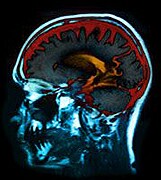- Recognizing the Signs of Hypothyroidism
- 10 Strategies to Overcome Insomnia
- Could Artificial Sweeteners Be Aging the Brain Faster?
- Techniques for Soothing Your Nervous System
- Does the Water in Your House Smell Funny? Here’s Why
- Can a Daily Dose of Apple Cider Vinegar Actually Aid Weight Loss?
- 6 Health Beverages That Can Actually Spike Your Blood Sugar
- Treatment Options for Social Anxiety Disorder
- Understanding the Connection Between Anxiety and Depression
- How Daily Prunes Can Influence Cholesterol and Inflammation
Alzheimer’s Gene Tied to Brain Changes at Early Age


People with a high-risk gene for Alzheimer’s disease can begin to have brain changes as early as childhood, according to a new study.
The SORL1 gene is one of several associated with an increased risk of late-onset Alzheimer’s, the most common form of the disease. SORL1 carries the code for a specific type of receptor that helps recycle certain molecules in the brain before they develop into beta-amyloid. Beta-amyloid is a protein associated with Alzheimer’s.
The gene is also involved in fat metabolism, which is linked to a different “pathway” for developing Alzheimer’s, the study authors noted.
For the study, the researchers conducted brain scans of healthy people aged 8 to 86. Study participants with a specific copy of SORL1 had reductions in white matter connections that are important for memory and higher thinking. This was true even in the youngest participants.
The investigators then examined brain tissue from 189 dead people who had not had Alzheimer’s, who ranged in age from less than 1 year to 92 years. Those with the specific copy of the SORL1 gene showed disruption in the code “translation” process.
Finally, the team analyzed brain tissue from 710 dead people, aged 66 to 108. Most of them had mild cognitive [thinking] impairment or Alzheimer’s. The results showed that the SORL1 risk gene was associated with the presence of beta-amyloid.
The study was published online recently in the journal Molecular Psychiatry.
“We need to understand where, when and how these Alzheimer’s risk genes affect the brain, by studying the biological pathways through which they work. Through this knowledge, we can begin to design interventions at the right time, for the right people,” study leader Dr. Aristotle Voineskos, of the Centre for Addiction and Mental Health in Toronto, said in a center news release.
He noted that a combination of risk factors — unhealthy diet, lack of exercise, smoking and high blood pressure combined with a person’s genetic profile — all contribute to Alzheimer’s risk.
“The gene has a relatively small effect, but the changes are reliable, and may represent one ‘hit’, among a pathway of hits required to develop Alzheimer’s disease later in life,” Voineskos said.
More information
The U.S. National Institute on Aging has more about Alzheimer’s disease.
Source: HealthDay
Copyright © 2026 HealthDay. All rights reserved.










